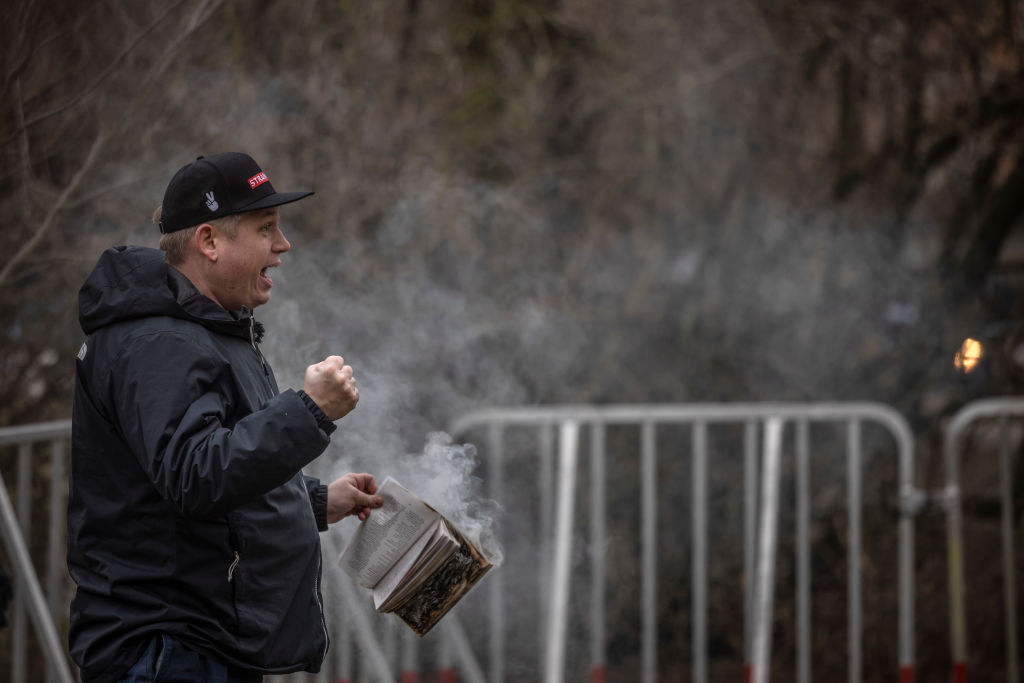Nobody came well out of the Quran-scuffing incident at Kettlethorpe High School in Wakefield last month. Following calls from Islamic fundamentalists for severe measures to suppress any insults to Islam, the headmaster of the school concerned largely took their side rather than dismiss the incident as the school triviality it was; the council that employed him was equally pusillanimous. The police also chose to appease the hotheads by initially recording an entirely inadvertent cause of offence as a hate incident: only later it seems, with bad grace, did they condescend to gently reprimand a child over death threats to the boy who had dropped the book.
It is hard to see all this as anything other than a threat to liberalism and democracy, and as presaging the reintroduction by the back door of a kind of blasphemy law we got rid of in 2008. One person who agrees wholeheartedly with this assessment is right-wing Danish politician Rasmus Paludan, founder of the Danish Stram Kurs party and well-known attacker of Islam, who is determined to keep the controversy going. A few days ago he announced his intention to visit Wakefield and publicly burn the Quran there in protest at the subversion of democratic values.
This was not to be, however. Tipped off by Labour MP Simon Lightwood, the government acted quickly: Tom Tugendhat announced in Parliament on Monday that Paludan was persona non grata and would not be allowed into the UK.
At first sight, this seems rather illiberal. No religion ought to be given the power to constrain political discourse or behaviour in order to protect its adherents from being scandalised, and no government should help it by silencing its critics. If a Wakefield resident was to burn the Quran publicly in protest at the pretensions of the fundamentalists (something, incidentally, that can now cause you to be arrested on serious public order charges by police increasingly desperate not to appear anti-Islamic, as happened some years ago), we should fight to protect his right to free speech in the same way as we would if he had been a secularist or left-winger who had burnt a Bible or an American flag. But if so, why not do the same for Paludan? Or are we now keeping people out because of their political opinions?
Well, up to a point, Lord Copper. In fact Tom Tugendhat’s swift action was entirely right, and needs to be commended.
First, although Simon Lightwood’s objection to admitting Paludan was that he saw him (correctly) as a far-right Islamophobe holding unpleasant views on race, this is not why we are excluding him. Paludan is by all accounts an undesirable and unsavoury character: he has a history of knowingly and bumptiously provoking disorder when speaking in public.
Secondly, there is an important but subtle difference between exercising free speech and political agitation in someone else’s country. We should not refuse admission to a person merely because they hold, and might outspokenly express here, political views that many find very unpalatable. It would be very worrying if, for example, a Labour home secretary were to exclude Jordan Peterson as an undesirable alien, or a Tory to declare unwelcome far-left figures such as Alexandria Ocasio-Cortez or critical race theorist Kimberlé Crenshaw. But most countries accept that political activism tips the balance. There is no doubt as to which side of this line Paludan’s stunt would have fallen.
In short, however free visitors are to express their political views in this country, it remains important that we make it clear that this must stop short of direct agitation or intervention. Indeed this has long been our practice; as long ago as 1971, the then Conservative government controversially, but rightly, excluded the far-left German political agitator Rudi Dutschke on the basis that he had been engaging in unjustified political subversion, and then robustly defended its action in Parliament. In short, if there are protests to be made against UK government policies, these should be made by our voters, or at least those resident here, and not by peripatetic political pundits from other jurisdictions.
Not only is this right and sensible: it is also in the government’s interest. The person it showed the door this week was frankly a bit of an irrelevance: a rather silly far-right rabble-rouser who will soon be forgotten. But in future it may want to keep its powder dry to deal with rather more important and potentially harmful characters. Were there to be further mass demonstrations in favour of, say, Black Lives Matter or any number of other progressive causes, there is a very strong argument for saying that we are very happy to allow these, but that we will do our best to prevent them being led or whipped up by agitators brought in from abroad for the purpose.
Having reached the moral high ground in the case of Rasmus Paludan, we will be in a good position next time we are faced with demands for entry from some left-wing firebrand. It will make it much easier politely to tell them that they, like him, are unwelcome, and to mention that what is sauce for the goose should be sauce for the gander.






Comments